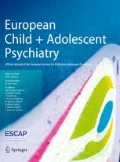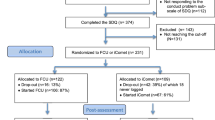Abstract
In this study, generalisation effects to day-care/school settings were examined in an outpatient clinic sample of 127 children aged 4–8 years treated because of oppositional conduct problems in the home with parent training (PT) and parent training combined with child therapy (CT) (“Incredible Years”). Before treatment all children scored above the 90th percentile on the Eyberg Child Behavior Inventory (ECBI) for home problems, and met criteria for a possible or a confirmed diagnosis of either an oppositional defiant (ODD) or a conduct (CD) disorder. Further, 83% of the children showed clinical levels of conduct problems both at home and in day-care/school before treatment. Although most children improved at home, the majority still showed clinical levels of conduct problems in day-care/school settings after treatment and 1-year later. Combined PT and CT produced the most powerful and significant generalisation effects across the treatment period, however these improvements were not maintained 1-year later for most areas. The results of the present study, therefore, underline the need to target conduct problems not only exhibited at home but also in day-care/school settings, and to develop strategies to maintain positive generalisation effects after treatment for this age and problem-group.
Similar content being viewed by others
References
Achenbach TM (1991) Manual for the Child Behavior Checklist 4–18 and 1991 profile. University of Vermont, Department of Psychiatry, Burlington
Achenbach TM (1991) Manual for the Teacher Report Form and 1991 profile. University of Vermont, Department of Psychiatry, Burlington
Angold A, Castello JE (1996) Toward establishing an empirical basis for the diagnosis of oppositional defiant disorder. Journal of the American Academy of Child and Adolescent Psychiatry 35:1205–1212
Barrera M, Biglan A, Taylor TK, Gunn BK, Smolkowski K, Black C, Ary DV, Bates JE, Pettit GS, Dodge KA, Ridge B (1998) Interaction of temperamental resistance to control and restrictive parenting in the development of externalizing behavior. Developmental Psychology 34:982–995
Behar LB (1977) The preschool behavior questionnaire. Journal of Abnormal Child Psychology 5:265–275
Boggs SR, Eyberg S, Reynolds LA (1990) Concurrent validity of the Eyberg Child Behavior Inventory. Journal of Clinical Child Psychology 19:75–78
Breiner J, Forehand R (1981) An assessment of the effects of parent training on clinic-referred children’s school behavior. Behavioral Assessment 3:31–42
Brestan EV, Eyberg SM (1998) Effective psychosocial treatments of conduct-disordered children and adolescents: 29 years, 82 studies, and 5,272 kids. Journal of Clinical Child Psychology 27(2):180–187
Campbell SB (2002) Behavior problems in preschool children. Guilford Press, New York
Clifford G, Lurie J (2004) Prevalence for behavioural disorder in children 9–12 years in five Norwegian communities. Unpublished manuscript, University of Trondheim
Cohen J (1988) Statistical power analysis for the behavioral sciences. Erlbaum, Hillsdale, NJ
Conduct Problems Prevention Research Group (2002) Using the Fast Track randomized prevention trial to test the early-starter model of the development of serious conduct problems. Development and Psychopathology 14:925–943
Forehand R, Sturgis ET, McMahon RJ, Aguar D, Green K, Wells KC, Breiner J (1979) Parent behavioral training to modify child noncompliance. Behavior Modification 3(1):3–25
Funderburk BW, Eyberg SM, Newcomb K, McNeil CB, Hembree-Kigin T, Capage L (1998) Parent–child interaction therapy with behavior problem children: Maintenance of treatment effects in the school setting. Child and Family Behavior Therapy 20(2):17–38
Kazdin AE (1997) Practitioner review: psychosocial treatments for conduct disorder in children. Journal of Child Psychology and Psychiatry and Allied Disciplines 38(2):161–178
Kaufman J, Birmaher B, Brent D, Flynn C, Morcei P (1997) Schedule for affective disorders and schizophrenia for school-age children-present and lifetime version (K-SADS-PL): initial and validity data. Journal of American Academy of Child and Adolescent Psychiatry 36:980–988
LaFreniere PJ, Dumas JE (1995) Social competence and behavior evaluation (SCBE). Western Psychological Services, Los Angeles
McNeil CB, Eyberg S, Eisenstadt TH, Newcomb K, Funderburk B (1991) Parent–child interaction therapy with behavior problem children: Generalization of treatment effects to the school setting. Journal of Clinical Child Psychology 20(2):140–151
Moffitt TE (1993) “Life-course-persistent” and “adolescence-limited” antisocial behavior: a developmental taxonomy. Psychological review 100:674–701
Morch WT, Clifford G, Larsson B, Rypdal P, Drugli MB, Fossum S (2005) Treatment of oppositional and conduct disorders in 4–8 Year old children using child therapy and/or parent management training. Manuscript in preparation
Pianta RC (1996) Manual and scoring guide for the student–teacher relationship scale. University of Virginia
Ramsey E, Patterson GR, Walker HM (1990) Generalization of the antisocial trait from home to school settings. Journal of Applied Developmental Psychology 11:209–223
Reedtz C, Morch WT (2005) Standardization of an assessment tool for identifying conduct problems in children: obtaining Norwegian norms for the Eyberg Child Behavior Inventory (ECBI). Unpublished manuscript, University of Tromsø
Reid JB, Eddy JM, Fetrow RA, Stoolmiller M (1999) Description and immediate impacts of a preventive intervention for conduct problems. American Journal of Community Psychology 27(4):483–517
Reid MJ, Webster-Stratton C, Hammond M (2003) Follow-up of children who received the Incredible years intervention for oppositional disorder: maintenance and prediction of 2-year outcome. Behavior Therapy 34(4):471–491
Robinson EA, Eyberg SM, Ross AW (1980) The standardization of an inventory of child conduct problem behaviours. Journal of Clinical Child Psychology 19:1344–1349
Scott S, Spender Q, Doolan M, Jacobs B, Aspland H (2001) Multicentre controlled trial of parenting groups for childhood antisocial behaviour in clinical practice. British Medical Journal 323:194–198
Scott S (2005) Do parenting programmes for severe child antisocial behaviour work over the longer term, and for whom? One year follow-up of a multi-centre controlled trial. Behavioural and Cognitive Psychotherapy 33:1–19
Taylor TK, Biglan A (1998) Behavioral family interventions for improving child-rearing: A review of the literature for clinicians and policy makers. Clinical Child and Family Psychology Review 1(1):41–60
Taylor TK, Schmidt F, Pepler D, Hodgins C (1998) A comparison of eclectic treatment with Webster-Stratton’s parents and children series in a children’s mental health center: a randomized controlled trial. Behavior Therapy 29:221–240
Taylor TK, Eddy JM, Biglan A (1999) Interpersonal skills training to reduce aggressive and delinquent behavior: limited evidence and the need for an evidence-based system of care. Clinical Child and Family Psychology Review 2(3):169–182
Webster-Stratton C (1998) Preventing conduct problems in Head Start children: strengthening parenting competencies. Journal of Consulting and Clinical Psychology 66:715–730
Webster-Stratton C, Hammond M (1997) Treating children with early-onset conduct problems: a comparison of child and parent training interventions. Journal of Consulting and Clinical Psychology 65(1):93–109
Webster-Stratton C, Hammond M (1998) Conduct problems and level of social competence in Head Start children: prevalence, pervasiveness, and associated risk factors. Clinical Child and Family Psychology Review 1:101–124
Webster-Stratton C, Lindsay DW (1999) Social competence and conduct problems in young children: issues in assessment. Journal of Clinical Child Psychology 28:25–43
Webster-Stratton C, Reid JM, Hammond M (2004) Treating children with early-onset conduct problems: intervention outcomes for parent, child, and teacher training. Journal of Clinical Child and Adolescent Psychology 3(1):105–124
Author information
Authors and Affiliations
Corresponding author
Rights and permissions
About this article
Cite this article
Drugli, M.B., Larsson, B. Children aged 4–8 years treated with parent training and child therapy because of conduct problems: generalisation effects to day-care and school settings. Eur Child Adolesc Psychiatry 15, 392–399 (2006). https://doi.org/10.1007/s00787-006-0546-3
Accepted:
Published:
Issue Date:
DOI: https://doi.org/10.1007/s00787-006-0546-3




